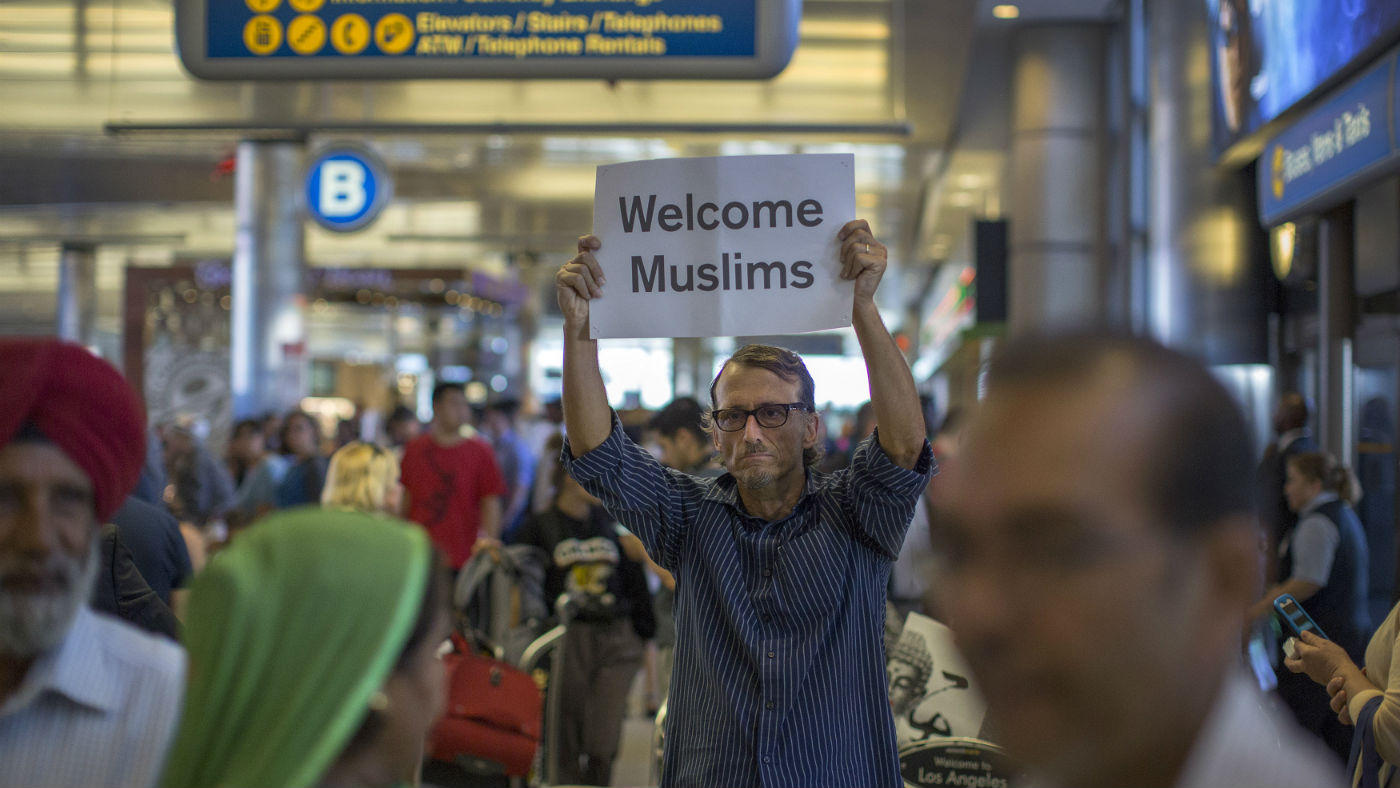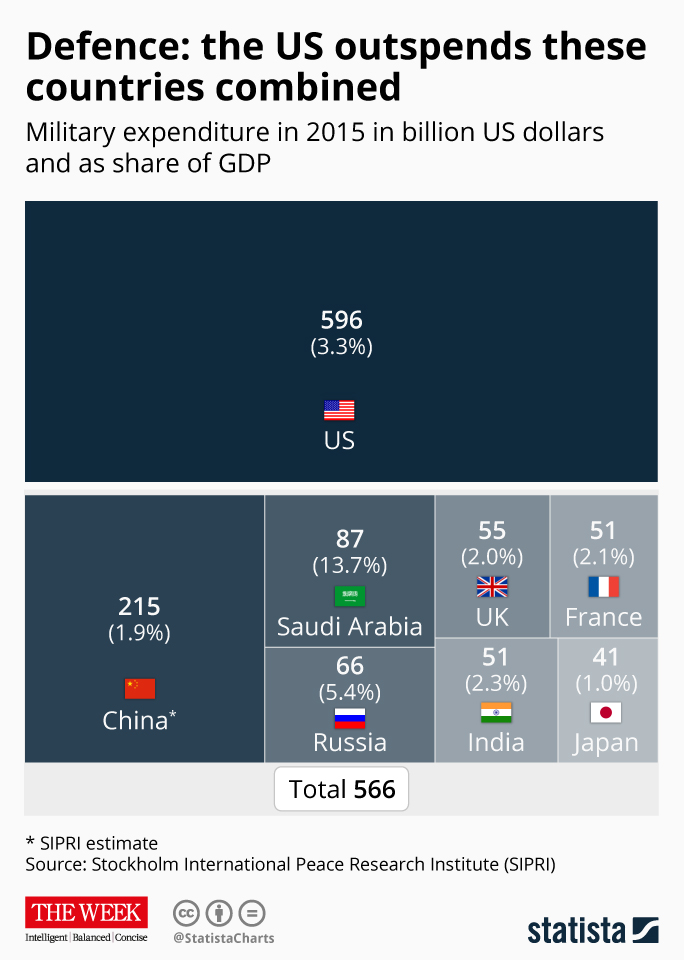Trump travel ban: Judge expands definition of relatives
Grandparents and other family members to be allowed entry to US

A free daily email with the biggest news stories of the day – and the best features from TheWeek.com
You are now subscribed
Your newsletter sign-up was successful
Donald Trump to ramp up military budget by 10%
28 February
Donald Trump has announced plans for a $54bn (£43bn) increase in military spending, raising the Pentagon's total budget by ten per cent to $603bn (£484bn).
The US President "intends to slash spending on many of the federal government's most politically sensitive programmes - relating to education, the environment, science and poverty - to protect the economic security of retirees and to shift billions more to the armed forces", says the New York Times.
The Week
Escape your echo chamber. Get the facts behind the news, plus analysis from multiple perspectives.

Sign up for The Week's Free Newsletters
From our morning news briefing to a weekly Good News Newsletter, get the best of The Week delivered directly to your inbox.
From our morning news briefing to a weekly Good News Newsletter, get the best of The Week delivered directly to your inbox.
Trump said: "The budget will include an historic increase in defence spending to rebuild the depleted military of the United States of America at a time we most need it."
He added: "We are going to do more with less and make the government lean and accountable to the people."

The plans have been criticised from both the left and right.
Republican John McCain, the chairman of the Senate armed services committee, said Trump's proposal was insufficient, while Democrats complained the cuts needed to fund additional military spending would cripple important domestic programmes.
A free daily email with the biggest news stories of the day – and the best features from TheWeek.com
Democratic House minority leader Nancy Pelosi said "The President is surrendering America's leadership in innovation, education, science and clean energy."
Trump will address Congress later today and is expected to talk about infrastructure spending.
Infographic by statista.com for TheWeek.co.uk.
Donald Trump revokes transgender bathroom guidelines
23 February
Donald Trump's administration has revoked controversial guidelines put in place by Barack Obama that allowed transgender students in schools to use the toilet of their choice.
Under the ruling, which was issued last May, students had to be allowed to use bathrooms matching their chosen gender identity. Schools that did not comply were threatened with having funding withheld.
However, Attorney General Jeff Sessions, who took office at the beginning of this month, said the guidance lacked sufficient legal basis and individual states should decide on the issue.
The move signals that the Trump administration "does not necessarily interpret current federal civil rights protections as prohibiting discrimination based on gender identity", The Guardian says.
During his election campaign, Trump said transgender students should "use the bathroom they feel is appropriate", but he has reversed his stance following criticism from the Republican Party.
Transgender rights advocates say the move will "create another layer of confusion for schools and will make transgender students, who are already vulnerable, more so", says the Washington Post.
However, overturning the existing guidance will have little immediate impact, as it had been put on hold by a US district judge in Texas after 13 states sued last year to prevent its introduction.
Donald Trump drops two-state solution to Israeli-Palestinian conflict
16 February
Donald Trump has "retreated from more than two decades of US policy-making in the Middle East" by dropping the demand for a two-state solution to the Israeli-Palestinian conflict, says the Financial Times.
After meeting Israel's Prime Minister Benjamin Netanyahu yesterday, the US President said he would work diligently to "encourage a peace and, really, a great peace deal", but would not dictate the terms of negotiations.
He added: "I'm looking at two-state and one-state and I like the one that both parties like. I can live with either one."
A two-state solution has been a central aim of US foreign policy for decades and was embraced by both the Israeli government and the Palestinian Authority, as well the United Nations, the Arab League, the European Union and Russia.
"It is the shorthand for a final settlement that would see the creation of an independent state of Palestine within pre-1967 ceasefire lines in the West Bank, Gaza Strip and East Jerusalem, living peacefully alongside Israel," says the BBC.
In recent years, however, it has seemed to be "an ever-fleeting dream, amid demographic changes, settlement expansion, security concerns, and eroding trust between the two parties", says Time magazine.
Experts on both sides have questioned the viability of the two-state solution because it would require removing many of the 420,000 Israeli settlers living in the West Bank and dividing Jerusalem, "which even centre-left politicians refuse to accept", says The Times.
Jeremy Bowen, the BBC's Middle East editor, says Israeli hardliners want President Trump to drop the idea of two states "as they believe the land needed for a Palestinian state should be part of Israel".
Alternatives include the so-called "one-state solution", says the Times, "which has long been the preferred outcome for the Israeli right" and would see Israel annex large swathes of the West Bank and grant Israeli citizenship to any Palestinians who live there.
Another option is a confederation in which the two governments would share the same territory.
However, the UN secretary-general Antonio Guterres said there was "no alternative" to a two-state solution, while for Palestinians, "even the notion of a US retreat from the internationally backed goal of a future Palestine existing alongside Israel is alarming", says the Jerusalem Post.
-
 The ‘ravenous’ demand for Cornish minerals
The ‘ravenous’ demand for Cornish mineralsUnder the Radar Growing need for critical minerals to power tech has intensified ‘appetite’ for lithium, which could be a ‘huge boon’ for local economy
-
 Why are election experts taking Trump’s midterm threats seriously?
Why are election experts taking Trump’s midterm threats seriously?IN THE SPOTLIGHT As the president muses about polling place deployments and a centralized electoral system aimed at one-party control, lawmakers are taking this administration at its word
-
 ‘Restaurateurs have become millionaires’
‘Restaurateurs have become millionaires’Instant Opinion Opinion, comment and editorials of the day
-
 Why are election experts taking Trump’s midterm threats seriously?
Why are election experts taking Trump’s midterm threats seriously?IN THE SPOTLIGHT As the president muses about polling place deployments and a centralized electoral system aimed at one-party control, lawmakers are taking this administration at its word
-
 ‘Restaurateurs have become millionaires’
‘Restaurateurs have become millionaires’Instant Opinion Opinion, comment and editorials of the day
-
 Should the EU and UK join Trump’s board of peace?
Should the EU and UK join Trump’s board of peace?Today's Big Question After rushing to praise the initiative European leaders are now alarmed
-
 Witkoff and Kushner tackle Ukraine, Iran in Geneva
Witkoff and Kushner tackle Ukraine, Iran in GenevaSpeed Read Steve Witkoff and Jared Kushner held negotiations aimed at securing a nuclear deal with Iran and an end to Russia’s war in Ukraine
-
 Kurt Olsen: Trump’s ‘Stop the Steal’ lawyer playing a major White House role
Kurt Olsen: Trump’s ‘Stop the Steal’ lawyer playing a major White House roleIn the Spotlight Olsen reportedly has access to significant US intelligence
-
 Trump’s EPA kills legal basis for federal climate policy
Trump’s EPA kills legal basis for federal climate policySpeed Read The government’s authority to regulate several planet-warming pollutants has been repealed
-
 House votes to end Trump’s Canada tariffs
House votes to end Trump’s Canada tariffsSpeed Read Six Republicans joined with Democrats to repeal the president’s tariffs
-
 Bondi, Democrats clash over Epstein in hearing
Bondi, Democrats clash over Epstein in hearingSpeed Read Attorney General Pam Bondi ignored survivors of convicted sex offender Jeffrey Epstein and demanded that Democrats apologize to Trump